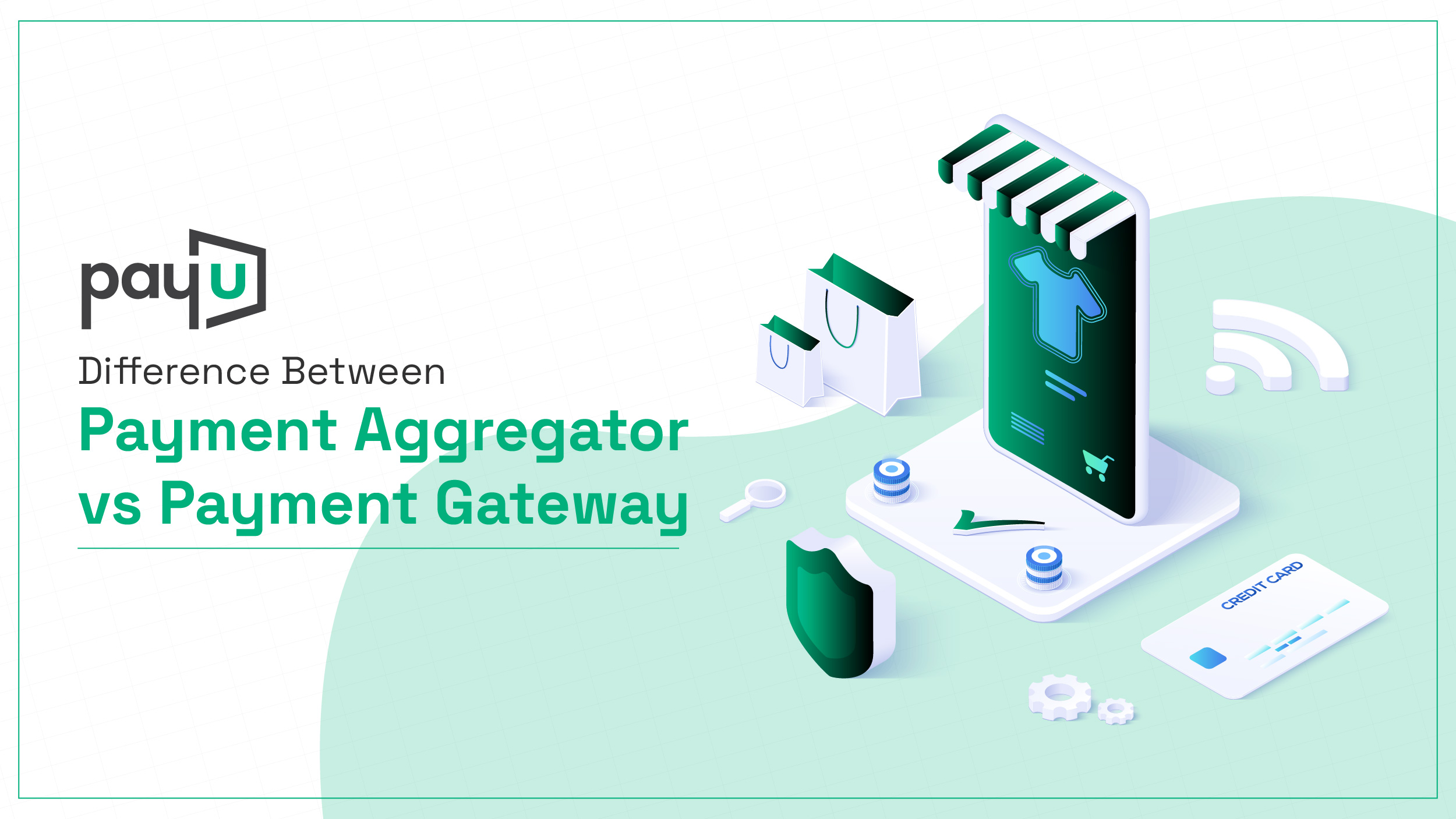
Businesses in today’s world of digital economy must offer secure, efficient payment solutions to enhance customer experience. Two of the most essential technologies that facilitate these payments are payment gateways and payment aggregators. While both enable businesses to accept online payments, their structure, features and suitability differ based on business needs. Understanding these differences is important for making an informed decision that aligns with your business needs.
Let’s closely analyze payment gateways vs payment aggregators to help you select the most suitable option for your enterprise.
| Table of Contents Key Differences: Payment Gateway Vs Payment Aggregator What is Payment Gateway? What is Payment Aggregator? Understanding the Difference with a Real-world Example Choosing the Right Solution for Your Business Conclusion Frequently Asked Questions |
Key Differences: Payment Gateway Vs Payment Aggregator
A detailed comparison of payment gateway vs payment aggregator across key features is outlined in the table below.
| Feature | Payment Gateway | Payment Aggregator |
| Merchant Account | Each business needs to establish a dedicated merchant account with an acquiring bank. | Allows multiple businesses to operate under a shared merchant account which is managed by the aggregator. |
| Integration Complexity | Businesses must integrate separately with each payment method or bank, which can be time-consuming and technically demanding. | It simplifies the setup process by offering a single integration point for multiple payment methods. |
| Services Provided | Primarily focuses on transaction processing without additional services. | Provides comprehensive services, including transaction processing, reporting, analytics, and customer support. |
| Security and Compliance | Merchants are responsible for ensuring compliance with security standards such as PCI-DSS. | The aggregator manages security compliance, reducing the burden on individual merchants. |
| Capitalization | Payment gateways are not subject to specific capitalization guidelines set by the RBI. | Non-bank payment aggregators must maintain a net worth above ₹25 crore. |
| Authorization Protocols | Banks operating payment gateways must adhere to the ‘Guidelines on Managing Risks and Code of Conduct in Outsourcing of Financial Services by banks’ issued by the RBI. Non-bank payment gateways follow RBI guidelines for technology providers for banks. | Non-bank payment aggregators require authorization from the Reserve Bank of India (RBI) under the Payment and Settlement Systems Act. Bank payment aggregators are exempt from this requirement, as banks already handle funds in their daily operations. |
| Setup Time and Cost | Involves a longer setup period due to bank approvals and may incur higher initial costs. | Enables quicker setup with lower upfront expenses, though per-transaction fees might be higher. |
| Ideal For | Larger businesses with high transaction volumes seeking greater control and potentially lower transaction fees over time. | Small to medium-sized enterprises (SMEs), startups, and freelancers looking for a cost-effective, easy-to-implement solution without the complexities of managing individual merchant accounts. |
Now that we’ve understood the crucial differences between payment gateway vs payment, let’s explore in detail about how they function in the real world and which one you should consider for your business.
What is Payment Gateway?
A payment gateway enables merchants/ businesses to accept online payments by transmitting data in a secure manner between the customer, the merchant and the acquiring bank. It makes sure that sensitive payment information is encrypted and transferred safely. This in turn helps in the authorization and settlement of transactions.
Read more – How Payment Gateway Works?
What is Payment Aggregator?
A payment gateway as the name suggests, lets multiple merchants to accept various payment methods on a single platform. It entirely eliminates the need for individual merchant accounts with banks. This helps in streamlining operations and managing transactions under a unified roof.
Read more – Learn about Payment Aggregator in detail
Understanding the Difference with a Real World Example
Let’s take an example of a restaurant chain that wants to expand to online orders to understand the difference between payment aggregator and payment gateway from a business owner’s perspective.
Using a Payment Gateway
A restaurant chain with multiple locations decides to set up its own online ordering system through a website and mobile app. Since it operates at scale and wants full control over payment processing, it chooses a payment gateway.
1. The restaurant applies for a merchant account with its bank.
2. It integrates a payment gateway (like PayU) directly into its website and app.
3. When a customer places an order, the payment gateway encrypts the card/UPI details and sends them directly to the bank.
4. The bank processes the transaction and settles the funds directly into the restaurant’s account after clearing.
5. The restaurant benefits from lower per-transaction fees but has to manage its own payment settlements and security compliance.
Best suited for: Large businesses that want full control, faster settlements, and lower long-term costs.
Now, let’s say the same restaurant chain expands through franchises and cloud kitchens that operate independently. Instead of setting up separate merchant accounts for each new outlet, it chooses a payment aggregator (like Razorpay).
1. The restaurant signs up with a payment aggregator instead of applying for individual merchant accounts.
2. The aggregator collects customer payments on behalf of all the outlets using its own merchant account.
3. After deducting a transaction fee, the aggregator settles the payments to each restaurant location based on pre-agreed terms (e.g., every T+2 days).
4. The restaurant avoids dealing with bank approvals and gets a quick, hassle-free setup while still accepting multiple payment methods.
Best suited for: Small or growing businesses, franchise models, and startups that need a quick and easy way to start accepting payments.
Choosing the Right Solution for Your Business
Multiple factors come into play when you have to choose between a payment gateway and a payment aggregator. These may include your business size, transaction volume, technical capabilities, and other specific needs:
1. Payment Gateway: Suitable for well-established businesses that deal with large volumes of transactions requiring a customized solution and have the resources to manage the associated complexities and compliance requirements.
2. Payment Aggregator: Ideal for startups, individual entrepreneurs and SMEs mostly who seek a convenient, quick-to-implement payment solution with minimal setup requirements and comprehensive support services.
Conclusion
Payment gateways as well as payment aggregators play an important part in facilitating online transactions. Once you have carefully evaluated factors such as transaction volume, desired control level, and resource availability, you can implement a payment system that enhances customer experience and supports your business’s success.
Frequently Asked Questions (FAQs)
1. Which is more secure: a payment gateway or a payment aggregator?
Both payment gateways as well as aggregators prioritize security. In the case of a payment gateway, the merchant handles security compliance, whereas a payment aggregator manages it on behalf of the merchant.
2. Can a business use both a payment gateway and a payment aggregator?
Yes, both the systems can be used to leverage the quick setup of a payment aggregator while developing a customized solution with a payment gateway for long-term benefits.
3. How do fees compare between payment gateways and payment aggregators?
Payment aggregators involve a lower setup cost but they may charge higher transaction fees which largely suits small businesses with lower transaction volumes. Payment gateways usually come with higher setup charges but lower per-transaction fees, thus making them cost-effective for high-volume businesses.

